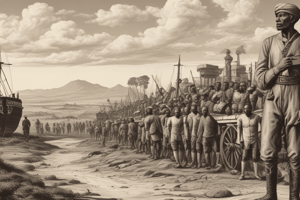Podcast
Questions and Answers
What hindered European exploration of Africa's interior?
What hindered European exploration of Africa's interior?
- African societies did not welcome European missionaries
- African trade networks did not accommodate European goods
- European steam-powered riverboats did not exist until the mid-1800s
- Disease and difficult river navigation discouraged exploration (correct)
What motivated many Europeans to explore and civilize Africa?
What motivated many Europeans to explore and civilize Africa?
- A curiosity about African cultures and traditions
- A desire to exploit African resources for personal gain
- A need to expand Christian missionary work in Africa
- A sense of racial superiority and a 'civilizing' mission (correct)
What social theory supported European colonialism in Africa?
What social theory supported European colonialism in Africa?
- Nationalism
- Imperialism
- Social Darwinism (correct)
- Marxism
Who was a prominent supporter of British expansion in Africa?
Who was a prominent supporter of British expansion in Africa?
When was Christianity introduced to most of Africa?
When was Christianity introduced to most of Africa?
What was the primary motivation for European nations to colonize Africa during the 19th and early 20th centuries?
What was the primary motivation for European nations to colonize Africa during the 19th and early 20th centuries?
What was the outcome of the Berlin Conference (1884-1885) between European nations?
What was the outcome of the Berlin Conference (1884-1885) between European nations?
What was the percentage of Africa's land controlled by Europeans as late as 1880?
What was the percentage of Africa's land controlled by Europeans as late as 1880?
What was the term used to describe the competition between European nations that resulted in Africa's colonization?
What was the term used to describe the competition between European nations that resulted in Africa's colonization?
Which of the following European nations was NOT one of the strongest nation-states in the late 19th century?
Which of the following European nations was NOT one of the strongest nation-states in the late 19th century?
Flashcards are hidden until you start studying
Study Notes
Industrialization and Imperialism
- European nations' ambitions grew with industrialization in the 19th century, leading to a need for raw materials and new markets.
- Africa was seen as a source of raw materials and a market for manufactured goods, contributing to its colonization.
The Scramble for Africa
- The Berlin Conference (1884-1885) marked the beginning of the scramble for Africa, where European nations competed for African territories.
- Between 1885 and 1910, European nations colonized most of Africa, with Britain, France, and Germany being the strongest competitors.
Africa Before European Domination
- Europeans had established contacts with sub-Saharan Africans as early as the 1450s, but African armies kept them out of most of Africa for 400 years.
- By 1880, Europeans controlled only 10% of the continent's land, mainly on the coast.
- European exploration was limited due to difficulties navigating African rivers and disease discouraging travel.
European Exploration and Perceptions of Africa
- The introduction of steam-powered riverboats in the early 1800s allowed for major expeditions into the interior of Africa.
- Travel books and newspapers helped shape European views of Africa, often perpetuating inaccurate and racialized stereotypes.
- Europeans viewed themselves as superior and believed it was their duty to "enlighten" and "civilize" people in the rest of the world.
Social Darwinism and Colonialism
- The theory of Social Darwinism justified colonialism in Africa, applying Charles Darwin's ideas about evolution and "survival of the fittest" to human society.
- Non-Europeans were seen as lower on the scale of cultural and physical development, justifying European colonization.
Christianity and Colonialism
- The colonization of Africa coincided with the expansion of Christian missionary activity in Africa.
- Christianity was introduced to most of Africa only in the modern era, with some parts, like Ethiopia and Egypt, having Christian populations from the beginning of Christianity.
Studying That Suits You
Use AI to generate personalized quizzes and flashcards to suit your learning preferences.




